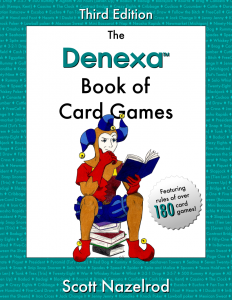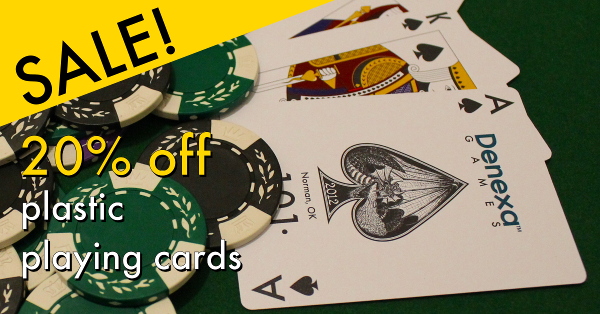Pay Me
Pay Me is a form of Contract Rummy for two to eight players. Much like in Three Thirteen Rummy, the number of cards dealt changes on every hand, and so do the wild cards!
Object of Pay Me
The object of Pay Me is to be the first player to form their entire hand into melds.
Setup
To play Pay Me, you’ll need a few decks of Denexa 100% Plastic Playing Cards with jokers included. The number of decks you’ll need depends on the number of players you have. One deck is just fine for two players; to play with three or four you’ll have to shuffle two decks with the same back design and color together. For five to eight players, add a third deck. You’ll also want something to keep score with, like pencil and paper.
The number of cards dealt changes on each hand. Deal each player three cards for the first hand of the game. Deal four cards on the second hand. Continue on in this fashion, with the hand size increasing by one on each hand. For the eleventh and final hand, each player will receive thirteen cards.
After the cards have been dealt, place the deck stub in the center of the table. This stack of cards becomes the stock. Turn the top card of the stock face up. This card, the upcard, will be the first card of the discard pile.
Game play
Play of the hand
Play starts with the player to the dealer’s left. Game play follows the usual Rummy pattern. A player starts their turn by drawing one card, either the top card of the discard pile (which is face up and known to the player) or the top card of the stock (which is unknown). The player then discards a card, ending their turn.
Pay Me, like all other rummy games, revolves around forming one’s hand into special combinations called melds. There are two types of melds: sets and runs (also known as sequences). A set is three or four cards of the same rank and different suits. Suits cannot be duplicated in a meld; a player can, however, have two separate melds of the same rank. A run consists of three or more consecutively-ranked cards of the same suit. When a player forms a meld, they keep it in their hand, rather than laying it on the table as in some other rummy games.
Wild cards
One unique feature of Pay Me is its use of wild cards. Jokers and 2s are always wild. In addition, the rank that corresponds to the number of cards dealt is wild, too. For example, on the first hand, when three cards are dealt, 3s are wild. On the next hand 4s are wild, and so on. On the ninth hand (consisting of eleven cards) jacks are wild, followed by queens on the tenth hand, and kings on the eleventh and final hand.
Wild cards can substitute for a card of any rank, or can be used as a card of its natural rank (except for jokers, of course). However, there are some restrictions on the use of wild cards in melds. No more than half of a meld can be wild cards. Additionally, in runs, two consecutive cards cannot be wild cards.
Going out
When a player has formed their entire hand into melds, they may go out by declaring “Pay me!” If they have a discard they would like to make, they can do so, but are not required to discard if the card can be melded. Each player then gets one final turn, during which they cannot draw from the discard; they must draw from the stock only. When the turn reaches the player who called “Pay me”, the hand ends.
Each player lays their hand face-up on the table, separated into melds. If a player has cards in their deadwood (unmatched cards) that can be used to extend melds held by the player that went out, they may lay off those cards on those melds. A player cannot lay off on melds belonging to any players other than the one that went out. A player also may not substitute cards they hold for wild cards in other players’ hands.
After laying off any cards they can, each player adds up the value of their deadwood as follows:
- Wild cards—15 points each
- Kings through 8s—10 points each
- 7s through aces—5 points each
Each player’s deadwood total is then added to their score.
Game play continues until eleven hands have been played. The player with the lowest score at that point wins the game.


